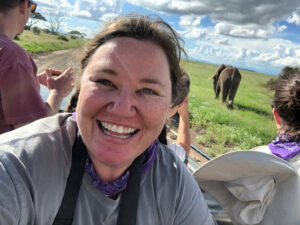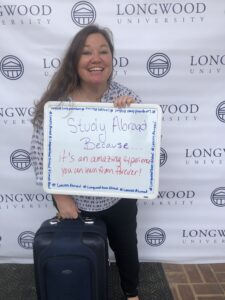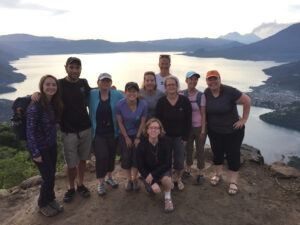What does life after the Brittain Fellowship look like? What opportunities within academia or in other sectors do Brittain Fellows pursue? And how does the postdoc prepare Brittain Fellows for these positions? The Professional Development Committee reached out to former Brittain Fellows to find out the answers to these questions and more. The interview below — featuring Emily Kane, Director of Study Abroad and Associate Director of the Center for Global Engagement at Longwood University, and a Brittain Fellow from 2012-13 — is the first of a series of interviews with former Fellows about their professional lives and career trajectories. Other interviews feature Brandy Simula, Andrea Krafft, and Rebecca Weaver). The interview has been lightly edited for clarity.
What years were you a Brittain Fellow/what institution did you come from?

Emily Kane travels to Amboseli National Park in Kenya as a part of work with study abroad programs
I came to Georgia Tech from UGA and served as a Brittain Fellow from 2012-13.
What is your job now, and what does your daily workday look like?
I am Director of Study Abroad and Associate Director of the Center for Global Engagement at Longwood University, a small public institution in central Virginia, my home state. I’ve been here for five and a half years now. I work 8:30-5 during the week, but I sometimes have evening or weekend events to attend as well. Typically, I work on study abroad program management, student recruitment and advising, faculty development as program leaders and in global engagement issues, partner relationship management, and cross-campus global engagement initiatives.
During normal non-pandemic times, I do some travel, visiting partner institutions and/or participating in partner site visits and attending conferences and workshops. I had the opportunity to visit a hands-on environmental science program in Kenya in December, and it was thrilling.
On occasion, I teach; I’ve taught sections of our versions of freshmen composition and introductory American literature, and I’ve just developed an Honors course called Global Engagement through Scholarship and Citizenship that I’m piloting this winter intersession.

Emily Kane holds a sign about the benefits of studying abroad at the Longwood University study abroad fair.
What was your path to your current position? What sort of contacts or experiences were helpful to securing that job?
The Brittain Fellowship prepared me well for my subsequent gig, which was to serve as Mellon/ACLS Public Fellow in New York’s Finger Lakes at Hobart and William Smith Colleges, where I was Program Officer in their Center for Global Education for two years. I actually heard about the ACLS Public Fellowship program from a tweet by Rachel Dean-Ruzicka. (Thanks, Rachel!)
Certainly, working so much in multimodal communication helped me significantly in thinking about the way I could apply my skills in many directions; I had developed a love for study abroad in graduate school, and Tech helped me to think more precisely about what I wanted to do with my research and project management skills in the long term. At Tech, I co-organized a symposium sponsored by Bedford St. Martin’s that focused on assessment, which was stressful but also helpful in thinking about how to bring people together and manage the expectations and participation of multiple stakeholders. I also did some consulting work with the business school. My time at Tech showed me how I craved and excelled at bigger-picture, cross-campus(es) work.
How have you transferred the skills that you developed as a Brittain fellow to your present position?
At Tech, I taught Technical Communication, and those skills were helpful in my getting and succeeding in the work at HWS; knowing how to teach students how to communicate their knowledge and experience effectively was key in advising students and developing a re-entry course at HWS, and the skill continues to serve me well here at Longwood. The Brittain Fellowship also provided me with an excellent network of thinkers; I love my cohort very much and continue to bounce ideas off them, collaborate with them, and rely on them.
Of the skills that you developed as a fellow, which have become most valuable to you?
The Brittain Fellowship really sharpened my skills and instincts about operating in different discourses; this has been super important as I work with faculty, staff, and students of different disciplinary, cultural, national, and economic backgrounds. It also solidified my own dedication to humanistic inquiry and how it can and should fuel and feed off of scientific inquiry.

Emily Kane poses with colleagues at Lake Atitlan in Guatemala
What Brittain Fellow opportunities (teaching, research, service…) were especially valuable to you?
Teaching Tech Comm helped me think more critically about how we communicate even more so than what we communicate, and how to reach STEM students more effectively. This helps me tremendously as I work with STEM faculty and students to accomplish study abroad goals (program development, program selection, etc.). Co-organizing and pulling off a symposium with attendees from all over made performing a similar task at Longwood much less daunting; in 2018, we hosted the Virginia Lessons from Abroad Conference, and brought students from all over the Commonwealth to campus to learn about how to apply their global experiences to their post-undergrad lives. Also, the constant collaboration and idea-bouncing I did with my fellow Fellows was hugely important; knowing that there are eager, smart, focused, can-do colleagues out there has fueled my ability and desire to reach out and collaborate well.
Is there anything you wish you’d done or done more of?
I wish I’d gotten to do study abroad work at Tech, too. I applied to teach on the China program, but my dear peers Christina van Houten and Patrick McHenry deservedly got the gig and thrived on it multiple times. Tech was lucky to have them! Still, I was grateful to be able to work with international students in Tech Comm and help them to achieve their goals. It’s easy to look back and think, “hm, I should have done X or Y more,” but I didn’t know at the time how helpful all the collaboration, planning, and big-picture-assessing would be, and I’m thankful for that.
